Social Protection
Context
The State of the World’s Cash 2020 report found:
- Working with, through and alongside social protection systems is now considered key to strengthening the humanitarian-development nexus and humanitarians are increasingly active in this space
- Practitioners find that the three biggest challenges to effective linkages are: (i) lack of coordination between the actors involved, (ii) social protection systems are not designed to respond to crises, (iii) humanitarian practitioners lack expertise in social protection
- Critically, there is no ‘one size fits all’ solution to linking CVA and social protection. Trade-offs between efficiency, effectiveness, accountability, and sustainability must be considered to ensure the best outcomes for people living in crisis and depends on context, existing systems, and timeframe. Linking will not always be appropriate and social protection systems may not meet all needs. In many contexts, in the short to medium term at least, humanitarian programming will be required to fill gaps.
Current Priorities
The CALP Network has invested intensely in this thematic area over the last few years. We will continue to work closely with the SPIAC-B Working group on linking humanitarian (cash) assistance and social protection (formerly the Grand Bargain Sub-Workstream on Social Protection) and with the SocialProtection.org platform and the Online Community Social Protection in Crisis Contexts to develop evidence, produce capacity building materials and provide technical support to coordination actors.
Community of Practice
SocialProtection.org hosts a dynamic and collaborative online community of practice (CoP) bringing together individuals from diverse backgrounds interested in expanding social protection in crisis-prone areas. The CoP offers a space to exchange documents, insights, and news in order to progress and learn together. Its inclusive and member-led approach offers organisations and individual members a forum to increase learning and outreach, facilitating the exchange of experiences and expanding knowledge. A discussion group hosted by dgroups.org complements these activities by connecting users rapidly via email.
SPACE
There are a wealth of relevant resources from ‘Social Protection Approaches To Covid-19: Expert Advice’ (SPACE) published in the CALP library.
Featured content

Linking Social Protection and Humanitarian Cash and Voucher Assistance
Report
There is a growing momentum and body of work around the idea of developing stronger links between humanitarian cash and voucher assistance (CVA) and social protection (SP). This Briefing Paper for the CALP Network, based on a literature review, a survey, and interviews, is intended to inform the CALP Network’s overall approach in this area, and subsequently its capacity building and...

Linking Social Protection and Humanitarian Cash
Blog Post
The case for social protection to help people cope with shocks has always been clear and never more obvious than during the current Covid-19 crisis. These issues are currently playing out in real time as governments, donors and aid agencies scramble to find ways to get more help to more people to cope with the economic consequences of illness and lockdown. As the virus starts to take hold in...

Linking Social Protection and humanitarian cash and voucher assistance (CVA) – what do we really know and where to start? Findings from the CALP Network commissioned high level briefing paper at the time of COVID-19
Webinar
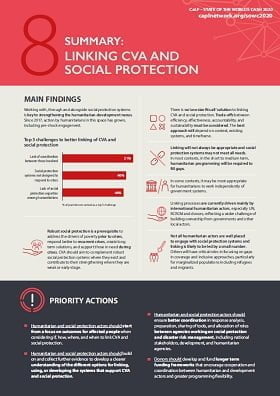
State of the World’s Cash 2020 Chapter 8 summary: Linking CVA and social protection
Report
Longstanding efforts to strengthen links between humanitarian CVA and social protection have been accelerated by the COVID-19 pandemic, with significant progress since the last report. CVA should aim to complement robust social protection systems where they exist and contribute to their strengthening where they are weak or early-stage. This chapter asks: ‘What opportunities and challenges...
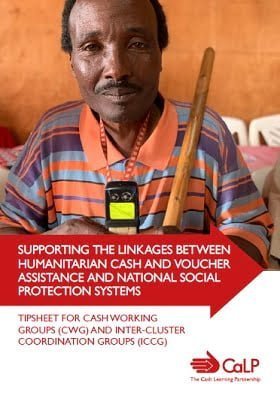
Supporting the Linkages Between Humanitarian Cash and Voucher Assistance and National Social Protection Systems
Report
This tipsheet aims to support country-level coordination efforts to strengthen the engagement between humanitarian coordination groups that implement cash and voucher assistance (CVA) and existing social
protection or disaster risk reduction coordination actors and groups. In particular, it seeks to offers inter-cluster and cash working group coordinators simple practical tips for engaging...
Case Studies

Linking CVA and Social Protection in the MENA Region – Crib sheet
Report
Building linkages between humanitarian cash and voucher assistance (CVA) and social protection (SP) has become an increasingly prominent topic over the past five years and the Middle East and North Africa (MENA) region has been at the centre of this evolution. The objective of this resource set (the crib sheet and 3, soon to be 6, regional case studies) is to ensure that the CALP Network...
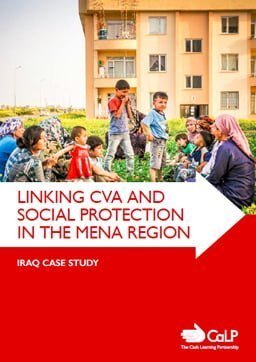
Linking CVA and Social Protection in the MENA Region – Iraq Case Study
Report
Building linkages between humanitarian cash and voucher assistance (CVA) and social protection (SP) has become an increasingly prominent topic over the past five years and the Middle East and North Africa (MENA) region has been at the centre of this evolution. The objective of this resource set (the crib sheet and 3, soon to be 6, regional case studies) is to ensure that the CALP Network...

Linking CVA and Social Protection in the MENA Region – Lebanon Case Study
Report
Building linkages between humanitarian cash and voucher assistance (CVA) and social protection (SP) has become an increasingly prominent topic over the past five years and the Middle East and North Africa (MENA) region has been at the centre of this evolution. The objective of this resource set (the crib sheet and 3, soon to be 6, regional case studies) is to ensure that the CALP Network...
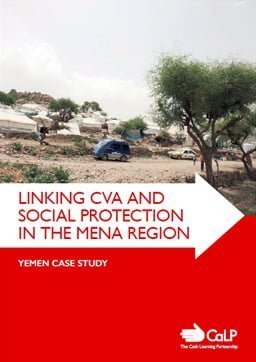
Linking CVA and Social Protection in the MENA Region – Yemen Case Study
Case Study
Building linkages between humanitarian cash and voucher assistance (CVA) and social protection (SP) has become an increasingly prominent topic over the past five years and the Middle East and North Africa (MENA) region has been at the centre of this evolution. The objective of this resource set (the crib sheet and 3, soon to be 6, regional case studies) is to ensure that the CALP Network...

Linking Cash and Voucher Assistance (CVA) and Social Protection – Occupied Palestinian Territories (OPT): Country Summary
Report
This country summary is part of a larger resource set, providing practitioners with examples of different approaches to linking CVA
and social protection.
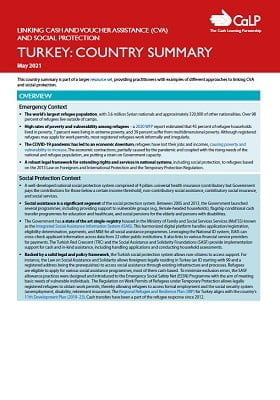
Linking Cash and Voucher Assistance (CVA) and Social Protection – Turkey: Country Summary
Report
This country summary is part of a larger resource set, providing practitioners with examples of different approaches to linking CVA
and social protection.
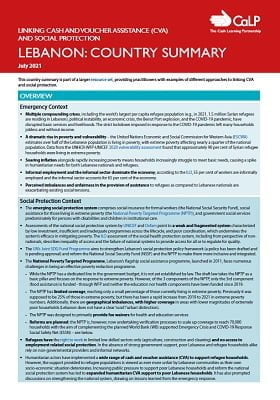
Linking Cash and Voucher Assistance (CVA) and Social Protection – Lebanon: Country Summary
Report
This country summary is part of a larger resource set, providing practitioners with examples of different approaches to linking CVA
and social protection.
Thematic lead
Latest

Toolkit for Monitoring and Evaluating Child Protection When Using Cash and Voucher Assistance
Guidelines and Tools
The Toolkit for Monitoring and Evaluating Child Protection when using Cash and Voucher Assistance (CP and CVA M&E Toolkit) is a resource for actors working in Monitoring and Evaluation, CVA (across sectors), and child protection. It aims to assess, address and monitor 1) Direct and indirect impact on...

Inclusive Information Systems for Social Protection: Intentionally Integrating Gender and Disability
Policy paper
Digital information systems serving the social protection sector, and especially social assistance, are increasingly prominent and will continue to be, as is the case within all other sectors. “Why? Because the ability of a country to care for its people and respond to their lifecycle needs depends on...
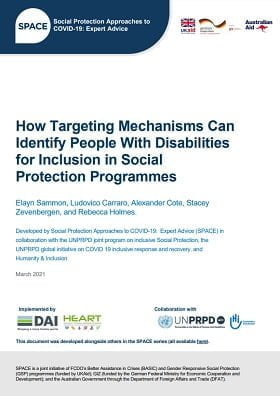
How Targeting Mechanisms Can Identify People With Disabilities for Inclusion in Social Protection Programmes
Guidelines and Tools
Persons with disabilities have worse education, health and employment outcomes and are more vulnerable to shocks than persons without disabilities. At the same time, they are less likely to be enrolled in social protection programmes, including those for which they are eligible. They can face significant...

COVID-19 and the Emergency Social Safety Net (ESSN) and Conditional Cash Transfers for Education (CCTE) programmes
Guidelines and Tools
FCDO Turkey commissioned SPACE to assess the impact of COVID-19 on the principal cash vehicles active in Turkey: Emergency Social Safety Net (ESSN) and Conditional Cash Transfers for Education (CCTE) programmes, both funded by the EU through the EUR 6 billion Facility for Refugees in Turkey (FRiT)...

Brief: Towards shock-responsive social protection: lessons from the COVID-19 response in Ethiopia
Policy paper
COVID-19 and national and international measures to curb its spread, may have pushed 15 million more people below the poverty line in Ethiopia. This policy brief draws on key learnings from the Ethiopia country case study, focused on the social protection response to COVID-19 and identifies...

Towards shock-responsive social protection: lessons from the COVID-19 response in Pakistan
Report
The stringent lockdown measures and global economic slowdown, due to COVID-19, are likely to increase the poverty rate in Pakistan by 35 percentage points in urban areas and 32 percentage points in rural areas. The report documents the Government of Pakistan’s social protection response to mitigate the...
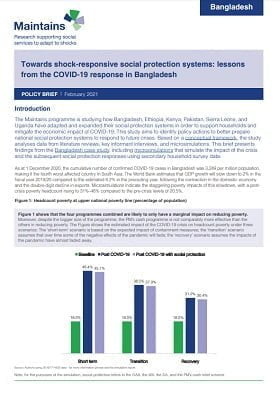
Towards shock-responsive social protection: lessons from the COVID-19 response in Bangladesh – Policy brief
Policy paper
This policy brief presents the key findings of the Bangladesh country report, exploring the social protection response to COVID-19 from the Government of Bangladesh. Considering factors that have both helped and hindered the effectiveness of policy responses at various levels, the brief presents...

Group Cash Transfers Guidance and Tools
Guidelines and Tools
This guidance highlights key steps and considerations to take to be able to design, implement and monitor GCTs. The guidance is accompanied by a set of tools, as well as references to existing tools, to help facilitating agencies and GCT-supported groups with implementing the approach. Furthermore, this...

Leveraging the Potential for Group Cash Transfers: A complementary report to the Group Cash Transfer: Guidance and Tools (pilot version)
Report
This report is an accompanying document to the GCT Guidance and Toolkit. The report identifies internal and institutional barriers to using and scaling GCTs, along with mitigation measures. These were identified through an online survey, literature review and interviews with key informants that engaged...

Tip-sheet: Engaging beyond CVA and GCT communities of practice: Supporting the uptake and scaling of Group Cash Transfers (GCTs)
Guidelines and Tools
The objective of this tip-sheet is to support facilitating agencies’1 staff, volunteers and associates in engaging beyond the Cash and Voucher Assistance (CVA) and GCT Communities of Practice (CoPs) and to help address barriers in designing and implementing GCTs. The key actions are based on the “GCT...

Humanitarian Cash and Social Protection in Yemen
Report
This report provides an overview of the humanitarian cash and social protection landscape in Yemen and presents clear recommendations on how improved collaboration and coordination between the two systems could increase overall impact. Cash transfers in Yemen, delivered through humanitarian actors and...

Humanitarian Cash and Social Protection in Iraq
Report
This report presents an overview of CVA and social protection in Iraq and offers recommendations to the HCT on how improved collaboration and coordination between the two systems could improve overall outcomes. State social protection programmes are a critical component of household income as the poverty...

2020 Cash and Voucher Programming (CVP): Roadmap and milestone achieved
Report
In 2020, World Vision has implemented cash and voucher programming like never before – not least due to the COVID-19 pandemic and related social protection transfer scale-ups. From 2019 to 2020, we have seen a 28 % increase of our cash, voucher based programming, moving towards enabling affected...

Towards shock-responsive social protection: lessons from the COVID-19 response in Bangladesh
Report
The COVID-19 crisis is likely to have a staggering impact on poverty in Bangladesh. This report documents the social protection responses by the Government of Bangladesh to mitigate the impact of the pandemic on vulnerable populations. Analysing factors that enabled and constrained the effectiveness of...

Towards Shock-Responsive Social Protection: Lessons from the COVID-19 Response in Bangladesh – Estimates from the Microsimulation
Case Study
This report presents the methodology and results of a microsimulation based on a partial equilibrium modelling framework using nationally representative household-level data for Bangladesh. The findings include an estimate of the potential impact of COVID-19 on poverty in the country based on a model that...

Tip Sheet on Integrating Cash and Voucher Assistance in HNOs and HRPs
Guidelines and Tools
The use of Cash and Voucher Assistance (CVA) has increased considerably in the past years from 10.6 per cent of international humanitarian assistance in 2016 to 19 per cent in 2020. Today, CVA is widely recognized as a more flexible and dignified modality for providing humanitarian assistance and is...

Basic Needs and Food Security Sector COVID-19 Emergency Response Standards for Non-camp Refugee Response
Report
The Basic Needs Working Group (BNWG), made up of more than 30 humanitarian organizations and agencies, has put into action its model for emergency response which encourages coordination of assistance, shares best practices, and provides a collaborative response. The COVID Response Task Force kicked off on...

Somalia Social Protection Donor Working Group – Terms of Reference (ToR)
Guidelines and Tools
Large-scale cash and voucher transfers have long formed the basis of the humanitarian response to crises in Somalia and successfully so. While sporadic small scale cash transfer projects in the past lacked coordination and coherence, this time a great deal of effort has been expended by donors and...

ASP Gap Analysis Template
Guidelines and Tools
This tool was developed to support the development of a roadmap for Adaptive Social Protection(ASP)in Indonesia. The goal of the “GapAnalysis” is to help governments and partners understand how far the current situation, that is current efforts in the context of ASP, aligns or diverges from the...

SPACE Economics of Early Response and Resilience to COVID-19: Ethiopia
Guidelines and Tools
The 2013 and 2018 Economics of Early Response and Resilience (TEERR) studies demonstrated the significant economic gains of investing in a more proactive response to crises. The first study was funded by DFID in 2013, followed by a more in-depth analysis in 2018 with USAID in three countries – Ethiopia,...




